|
|
|
Sort Order |
|
|
|
Items / Page
|
|
|
|
|
|
|
| Srl | Item |
| 1 |
ID:
099833
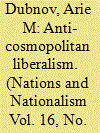

|
|
|
|
|
| Publication |
2010.
|
| Summary/Abstract |
The debate between contemporary cosmopolitans and advocates of nationalism is hardly new. Nevertheless, much of it is based on the erroneous assumption that cosmopolitanism should be seen as an outgrowth of liberalism, and that both should be considered as the complete conceptual opposites of nationalism. In this article I focus on two of the post-war Jewish anglophile intellectuals who took part in this debate during the Cold War years: the Oxonian liberal philosopher Sir Isaiah Berlin (1909-97) and the Israeli historian Jacob L. Talmon (1916-80). I use their examples to argue that the dividing line between cosmopolitans and advocates of nationalism should not be regarded as signifying the distinction between liberals and anti-liberals; in fact, this debate also took place within the camp of the liberal thinkers themselves. I divide my discussion into three parts. Firstly, I examine Berlin's and Talmon's positions within the post-war anti-totalitarian discourse, which came to be known as 'liberalism of fear'. Secondly, I show how a sense of Jewish identity, combined with deep Zionist convictions, induced both thinkers to divorce anti-nationalist cosmopolitanism - which they regarded as a hollow, illusionary ideal associated with impossible assimilationist yearnings - from the liberal idea. I conclude by suggesting that, although neither man had ever developed a systematic theoretical framework to deal with the complex interactions between ethno-nationalism, liberal individualism and multiculturalism, Berlin's vision of pluralism provides the foundations for building such a theory, in which liberalism and nationalism become complementary rather than conflicting notions.
|
|
|
|
|
|
|
|
|
|
|
|
|
|
|
|
| 2 |
ID:
123130
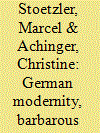

|
|
|
|
|
| Publication |
2013.
|
| Summary/Abstract |
This paper examines emblematic texts by two important protagonists of post-1848 liberalism in Germany, Gustav Freytag and Heinrich von Treitschke, focusing on their treatment of Jews and Poles. The paper analyses the social content of their statements and argues that the elements of anti-Semitism and anti-Slav racism that they contain were motivated by the specific kind of nationalist liberalism that frames their affirmation of the process of modernisation. This affirmation was directed against the Poles on the one hand, seen as backward Easterners who had to be pushed into civilisation by Prussian-German colonialism, and, on the other hand, the Jews, largely perceived as representing the wrong kind of modernity against which benign (supposedly German) modernity had to be protected. At the same time, the image of the Jew in Freytag and Treitschke also participates in that of the backward Easterner, permitting to see undesirable, allegedly Jewish aspects of modernity also as distortions resulting from an alien and ancient culture. This analysis has consequences for theorisations of both liberalism and nationalism: it suggests that the racism and anti-Semitism of nationalist liberals were intrinsically related to core aspects of the liberal world-view rather than being merely contingent opinions held by particular individuals. It also indicates that the nationalism of many German post-1848 liberals was ethnic as well as liberal. In this way, the paper contributes to the growing body of literature discussing the illiberal aspects of liberalism as well as the shortcomings of the long-established conceptual dichotomy of ethnic vs. liberal nationalism.
|
|
|
|
|
|
|
|
|
|
|
|
|
|
|
|
| 3 |
ID:
076745
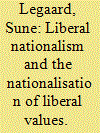

|
|
|
|
|
| Publication |
2007.
|
| Summary/Abstract |
This article considers whether appeals to 'national values' in public discourse and political debate might be a form of nationalism. This theoretical question about the applicability of the category of nationalism faces the objections that political values cannot constitute nationality, and that this is even more so the case when the values in question are liberal, as they often are. Against these objections, it is argued that 'the nationalisation of liberal values' may, and in some contexts of immigration and Europeanisation probably do, exhibit 'boundary mechanisms' that are among the central features of nationalism. This feature of the nationalisation of liberal values carries both normative and explanatory implications, which relate to the concerns of 'liberal nationalism'.
|
|
|
|
|
|
|
|
|
|
|
|
|
|
|
|
| 4 |
ID:
034463
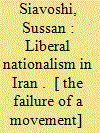

|
|
|
|
|
| Publication |
London, Westview Press, 1990.
|
| Description |
ix, 214p.pbk
|
| Series |
Westview Special Studies on the Middle East
|
| Standard Number |
0813374138
|
|
|
|
|
|
|
|
|
|
|
|
Copies: C:1/I:0,R:0,Q:0
Circulation
| Accession# | Call# | Current Location | Status | Policy | Location |
| 032191 | 955.053/SIA 032191 | Main | On Shelf | General | |
|
|
|
|
| 5 |
ID:
121409
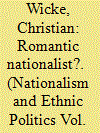

|
|
|
|
|
| Publication |
2013.
|
| Summary/Abstract |
This article analyzes the personal nationalism of Helmut Kohl, the so-called "Chancellor of Unity." The German politician acted as a (neo)romantic nationalist, who articulated his concept of nation in cultural and ethnic terms and as primarily detached from the idea of the nation-state. This kind of nationalism has been portrayed as something typically German and dangerous, as part of the nation's cultural Sonderweg outside of the West, where nationalism had taken a safer path. However, Kohl exemplified an ethnocultural representation of Germany that was reconciled with, and subordinated to, his liberal nationalism and his belief in the primacy of the West. Interestingly, his dialectic political rhetoric and biographical self-image demonstrates how romantic conceptualizations of German nationhood could be maintained after 1945, be structurally strengthened through the division of the nation during the Cold War, and that they have been part of the ongoing normalization process of German nationalism.
|
|
|
|
|
|
|
|
|
|
|
|
|
|
|
|
|
|
|
|
|